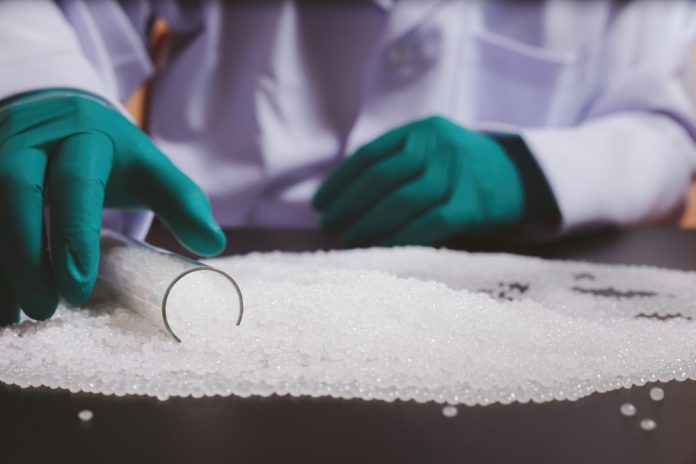As the global demand for advanced electronic devices continues to surge, the integration of sustainability into the field of electronics has become imperative.
The crux of this integration lies in the development of sustainable polymers, which hold the promise of redefining the lifecycle of electronic products.
Recent initiatives, such as those undertaken by Argonne National Laboratory, have made significant strides in fabricating luminescent polymers that are not only biodegradable but also recyclable.
These breakthroughs challenge the status quo, offering a glimpse into a future where electronics can coexist with environmental stewardship.
Yet, the journey towards a fully sustainable electronic landscape is rife with scientific, industrial, and regulatory complexities.
As such, the path forward demands a closer examination of the multifaceted implications of these advances and the potential they hold for a greener electronics paradigm.
The polymer challenge in electronics
The integration of polymers in electronics presents a significant challenge due to their contribution to electronic waste and the complexities involved in recycling these materials.
Luminescent polymers, valued for their light-emitting properties and versatility in modern devices such as car navigation displays and electronic screens, are particularly problematic.
The difficulties in addressing recycling processes for these materials stem from their complex chemical structures and the energy-intensive methods required to break them down.
As the electronics industry explores sustainable solutions, the development of new, biodegradable polymers that can be recycled more efficiently has become imperative.
Efforts to incorporate design strategies that enable easy recyclability without sacrificing performance are central to reducing the environmental impact of electronic waste.
Pioneering biodegradable polymers
Addressing the challenges presented by traditional luminescent polymers in electronics, researchers have made significant strides in the development of biodegradable alternatives that promise enhanced sustainability and recyclability.
This biodegradable innovation hinges on a novel design strategy incorporating tert-butyl ester, enabling the polymers to be broken down under mild conditions.
Impressively, the new polymer showcases a 15.1% electroluminescence efficiency, indicating its potential to maintain performance while being environmentally friendly.
The focus on polymer recycling and degradation could drastically reduce electronic waste, aligning with the growing demand for sustainable practices in the industry.
As this technology progresses, it may redefine not only disposal methods but also the very conception of electronic product lifecycles.
Enhancing electronics sustainability
In pursuit of a greener future, advancements in sustainable polymers are setting the stage for more environmentally friendly electronic devices.
These material innovations are critical in improving efficiency and reducing the ecological impact of consumer electronics.
By integrating biodegradable polymers into electronic components, researchers are creating a pathway for devices that can be easily recycled or decomposed, thus significantly diminishing the volume of electronic waste.
This forward-thinking approach not only addresses end-of-life disposal concerns but also encourages the industry to consider sustainability from the design phase.
As such, sustainable polymers are not merely an alternative; they represent a necessary evolution in electronics manufacturing, aligning technological progress with ecological responsibility.
Tackling electronic waste
Building on the momentum of sustainable polymer research, effective strategies for tackling electronic waste are becoming a critical focus for the industry.
The rapid accumulation of discarded electronic devices poses severe environmental challenges, necessitating robust e-waste management solutions.
Integrating circular economy applications into the design and lifecycle of electronic products ensures materials are reused, reducing overall waste.
The development of biodegradable polymers, as seen in recent advances, is a promising step towards minimising the footprint of electronic waste.
These innovations not only enable the efficient recycling of materials but also support the depolymerisation process, ensuring electronic components can be safely returned to the environment or repurposed in the manufacturing of new devices, thus contributing to a more sustainable electronics ecosystem.
Strengthening research collaborations
To fortify the advancements in sustainable polymers, research institutions are fostering stronger collaborations and pooling expertise and resources to innovate more effectively.
Harnessing the synergy of diverse scientific backgrounds, these collaborations are propelling interdisciplinary innovation and leading to collaborative breakthroughs that promise a more sustainable future for the electronics industry.
Funding and future directions
Recognising the catalytic role of interdisciplinary research in sustainable polymer development, securing robust funding and outlining clear future directives become imperative for continued innovation and application.
Exploring innovation in this field hinges on the strategic allocation of resources that propel research from laboratory breakthroughs to real-world solutions.
As such, funding strategies must be carefully crafted to support the entire lifecycle of technology development, from foundational research to commercial scale-up.
Investing in this domain not only addresses urgent environmental concerns but also unlocks economic opportunities.
Therefore, stakeholders, including governments, industry leaders, and academic institutions, must collaborate to ensure a steady stream of capital, fostering an ecosystem where sustainable polymers can truly revolutionise electronics and reduce our ecological footprint.





